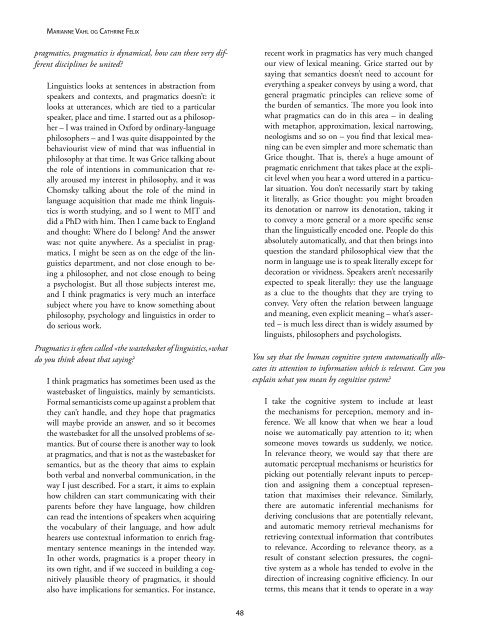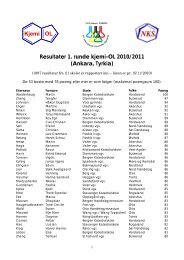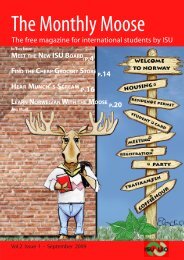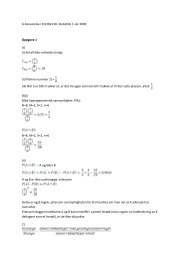filosofisk supplement - Universitetet i Oslo
filosofisk supplement - Universitetet i Oslo
filosofisk supplement - Universitetet i Oslo
- No tags were found...
Create successful ePaper yourself
Turn your PDF publications into a flip-book with our unique Google optimized e-Paper software.
Ma r ia n n e Va h l o g Ca t h r i n e Felixpragmatics, pragmatics is dynamical, how can these very differentdisciplines be united?Linguistics looks at sentences in abstraction fromspeakers and contexts, and pragmatics doesn’t: itlooks at utterances, which are tied to a particularspeaker, place and time. I started out as a philosopher– I was trained in Oxford by ordinary-languagephilosophers – and I was quite disappointed by thebehaviourist view of mind that was influential inphilosophy at that time. It was Grice talking aboutthe role of intentions in communication that reallyaroused my interest in philosophy, and it wasChomsky talking about the role of the mind inlanguage acquisition that made me think linguisticsis worth studying, and so I went to MIT anddid a PhD with him. Then I came back to Englandand thought: Where do I belong? And the answerwas: not quite anywhere. As a specialist in pragmatics,I might be seen as on the edge of the linguisticsdepartment, and not close enough to beinga philosopher, and not close enough to beinga psychologist. But all those subjects interest me,and I think pragmatics is very much an interfacesubject where you have to know something aboutphilosophy, psychology and linguistics in order todo serious work.Pragmatics is often called «the wastebasket of linguistics,»whatdo you think about that saying?I think pragmatics has sometimes been used as thewastebasket of linguistics, mainly by semanticists.Formal semanticists come up against a problem thatthey can’t handle, and they hope that pragmaticswill maybe provide an answer, and so it becomesthe wastebasket for all the unsolved problems of semantics.But of course there is another way to lookat pragmatics, and that is not as the wastebasket forsemantics, but as the theory that aims to explainboth verbal and nonverbal communication, in theway I just described. For a start, it aims to explainhow children can start communicating with theirparents before they have language, how childrencan read the intentions of speakers when acquiringthe vocabulary of their language, and how adulthearers use contextual information to enrich fragmentarysentence meanings in the intended way.In other words, pragmatics is a proper theory inits own right, and if we succeed in building a cognitivelyplausible theory of pragmatics, it shouldalso have implications for semantics. For instance,recent work in pragmatics has very much changedour view of lexical meaning. Grice started out bysaying that semantics doesn’t need to account foreverything a speaker conveys by using a word, thatgeneral pragmatic principles can relieve some ofthe burden of semantics. The more you look intowhat pragmatics can do in this area – in dealingwith metaphor, approximation, lexical narrowing,neologisms and so on – you find that lexical meaningcan be even simpler and more schematic thanGrice thought. That is, there’s a huge amount ofpragmatic enrichment that takes place at the explicitlevel when you hear a word uttered in a particularsituation. You don’t necessarily start by takingit literally, as Grice thought: you might broadenits denotation or narrow its denotation, taking itto convey a more general or a more specific sensethan the linguistically encoded one. People do thisabsolutely automatically, and that then brings intoquestion the standard philosophical view that thenorm in language use is to speak literally except fordecoration or vividness. Speakers aren’t necessarilyexpected to speak literally: they use the languageas a clue to the thoughts that they are trying toconvey. Very often the relation between languageand meaning, even explicit meaning – what’s asserted– is much less direct than is widely assumed bylinguists, philosophers and psychologists.You say that the human cognitive system automatically allocatesits attention to information which is relevant. Can youexplain what you mean by cognitive system?I take the cognitive system to include at leastthe mechanisms for perception, memory and inference.We all know that when we hear a loudnoise we automatically pay attention to it; whensomeone moves towards us suddenly, we notice.In relevance theory, we would say that there areautomatic perceptual mechanisms or heuristics forpicking out potentially relevant inputs to perceptionand assigning them a conceptual representationthat maximises their relevance. Similarly,there are automatic inferential mechanisms forderiving conclusions that are potentially relevant,and automatic memory retrieval mechanisms forretrieving contextual information that contributesto relevance. According to relevance theory, as aresult of constant selection pressures, the cognitivesystem as a whole has tended to evolve in thedirection of increasing cognitive efficiency. In ourterms, this means that it tends to operate in a way48
















